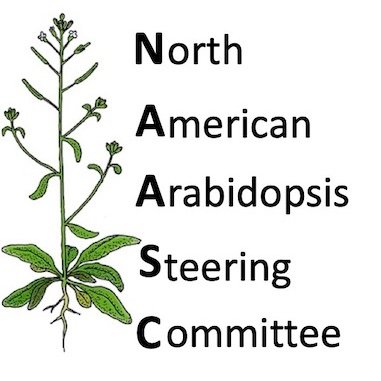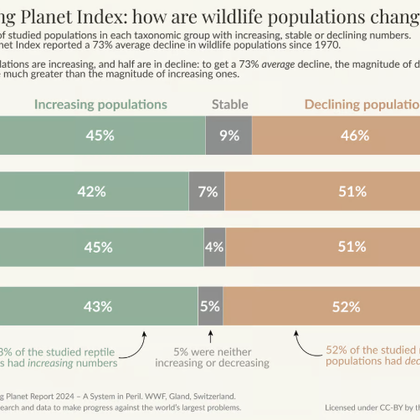
Moi Expósito-Alonso (#MOILAB)
@MExpositoAlonso
Followers
5K
Following
10K
Media
607
Statuses
5K
Researching from mutations to climate change • Prof at @UCBerkeley @Cal + Freeman Hrabowski Scholar @HHMInews • In 💚 w California 🌲🌱 🌵• ✊🏾🏳️🌈 💔🇮🇱🇵🇸
Berkeley, CA
Joined July 2014
Excited to release a huge evolution project on the works for many years: An experimental evolution project across climates to understand rapid adaptation Preprint: https://t.co/z3Zcffh5PU All data available: https://t.co/hgD7rSqPP9
#MOILAB
@UCBerkeley @HHMINEWS 🧵👇
4
30
94
The First Annual Virtual WALII Symposium: Exploring Life Without Water is ONE WEEK AWAY! 🗓️💧 Register now to join us on November, 18! https://t.co/tji3vMg4dt
0
3
5
Apply for our PhD program on Evolution Ecology Organismal Biology (Integrative! Biology) 🧬🌱🌎 🚨Dec 1 2025 deadline Check out the Flyer below for more information on our #MOILAB! Link to Flyer -> https://t.co/ODcvkMdiYE
@UCBerkeley
@HHMINEWS
4
30
89
Apply for our PhD program on Evolution Ecology Organismal Biology (Integrative! Biology) 🧬🌱🌎 🚨Dec 1 2025 deadline Check out the Flyer below for more information on our #MOILAB! Link to Flyer -> https://t.co/ODcvkMdiYE
@UCBerkeley
@HHMINEWS
4
30
89
Join us for the WALII Virtual Symposium on Tuesday, Nov 18, 2025! Abstract submissions for a contributed talk are NOW OPEN! Selected speakers will be chosen in Oct. & will present 10-12 min. talks followed by 3-5 min. of Q&A. Visit: https://t.co/BKZojdHUdq
0
1
1
Please share & RSVP to join the November 25th webinar! Hear from the 2025 Philip N. Benfey Arabidopsis Community Lifetime Achievement Awardees! https://t.co/y2HERzEQKN
0
3
11
To promote the collection, I’ve launched a designer clothing line where synthetic biology meets aesthetics. I will give out 100 free limited edition shirts to the first who retweet and order with their handle in the name! Available here → https://t.co/KctFUBPZQH 🧵(6/7)
3
47
80
All re-analyses can be reproduced from this public code: https://t.co/SL9wO46Evx
https://t.co/TGwQSUGYGU Please do reach with any questions, about paper or code, or calculations!
github.com
Contribute to moiexpositoalonsolab/gendivmeta development by creating an account on GitHub.
0
0
1
I want to thank Shaw et al. and corresponding author Prof. Grueber for their enormous effort in compiling genetic data from across the literature, for their thoughtful analyses, and for their engagement in correspondence regarding my inquiries. And many colleagues for feedback
1
0
1
Crucially, the lack of signal in my re-analyses does not mean genetic diversity is safe. Evolutionary theory also predicts an enormous genetic diversity extinction debt. To prevent future irreversible losses we must recover populations now - see forecast
biorxiv.org
Genetic diversity within species is the basis for evolutionary adaptive capacity and has recently been included as a target for protection in the United Nations’ Global Biodiversity Framework (GBF)....
1
0
1
Genetic diversity is likely declining globally, but evolutionary models predict small percentage losses are expected at short timescales, unless a species has truly plummeted in pop size (reviewed datasets published in the last decades generally cover short timescales, ~7 yrs).
1
0
1
Conservation policy typically speaks in terms of % diversity loss. I therefore attempted to translate the study’s reported effect sizes meta-regression, but found the percent changes to be close to ~0%, with half species decreasing, half species increasing in genetic diversity.
1
0
1
Many news outlets picked this up like The Guardian, World Economic Forum, etc: https://t.co/pddRWqt5jz
https://t.co/Hou6JWOz5s
weforum.org
Headlines this week: Species' genetic diversity 'declining'; What will US exit from Paris Agreement mean for climate?; Tyres are biggest source of nanoplastics in high Alps.
1
0
1
Earlier this year a very large review of genetic diversity trends within populations of >600 species was published in Nature, reporting a consistent significant genetic diversity decline across species. https://t.co/SALNYhL5fr
nature.com
Nature - A comprehensive meta-analysis of global terrestrial and marine genetic diversity covering more than three decades of research demonstrates rapid loss of genetic diversity and identifies...
1
0
1
*ALERT! GLOBAL GENETIC DIVERSITY TREND RE-ANALYSIS* "Signals of consistent genetic diversity decline are not yet measurable in global meta-analysis" https://t.co/SL9wO46Evx
1
0
2
Network, we are looking for PhD students and Postdocs on evolutionary and ecological genomics in 2025/2026 Join diverse and welcoming lab at @UCBerkeley @HHMINEWS! https://t.co/P9qmyY8BgJ Team members are giving talks at Evolution/GRC EEG/SMBE/ASPB this summer, reach out!
moilab.science
Join us! Our lab is based at the University of California, Berkeley, embedded in the vibrant and multicultural San Francisco Bay Area, surrounded by astonishing nature!
1
45
91
Network, we are looking for PhD students and Postdocs on evolutionary and ecological genomics in 2025/2026 Join diverse and welcoming lab at @UCBerkeley @HHMINEWS! https://t.co/P9qmyY8BgJ Team members are giving talks at Evolution/GRC EEG/SMBE/ASPB this summer, reach out!
moilab.science
Join us! Our lab is based at the University of California, Berkeley, embedded in the vibrant and multicultural San Francisco Bay Area, surrounded by astonishing nature!
1
45
91
Excited to release a huge evolution project on the works for many years: An experimental evolution project across climates to understand rapid adaptation Preprint: https://t.co/z3Zcffh5PU All data available: https://t.co/hgD7rSqPP9
#MOILAB
@UCBerkeley @HHMINEWS 🧵👇
4
30
94
Amazingly thankful to https://t.co/xQ7CcuCSMn consortium who persevered for years to run the experiments! And dream team Xing Wu and Tati Bellagio for final analyses/writing, Meixi and Lucas for comp. analyses, Ru Peng for enormous data, and +++ others! https://t.co/LXQVyPisQ1
biorxiv.org
Climate change is threatening species with extinction, and rapid evolutionary adaptation may be their only option for population rescue over short ecological timescales. However, direct observations...
0
0
0
Our big dataset let us to test whether evolution in a novel environments was predictable from the rest of the data We found early warning signals to anticipate if populations will adapt and persist or not – important lessons to incorporate evolution to biodiversity forecasts!
2
0
0
We tested whether such gene trajectories could have been predicted – we found genetic variants from warm regions of the species, increased in frequency in experimental evolution plots in warm outdoor locations, allowing us to build models
1
0
0







